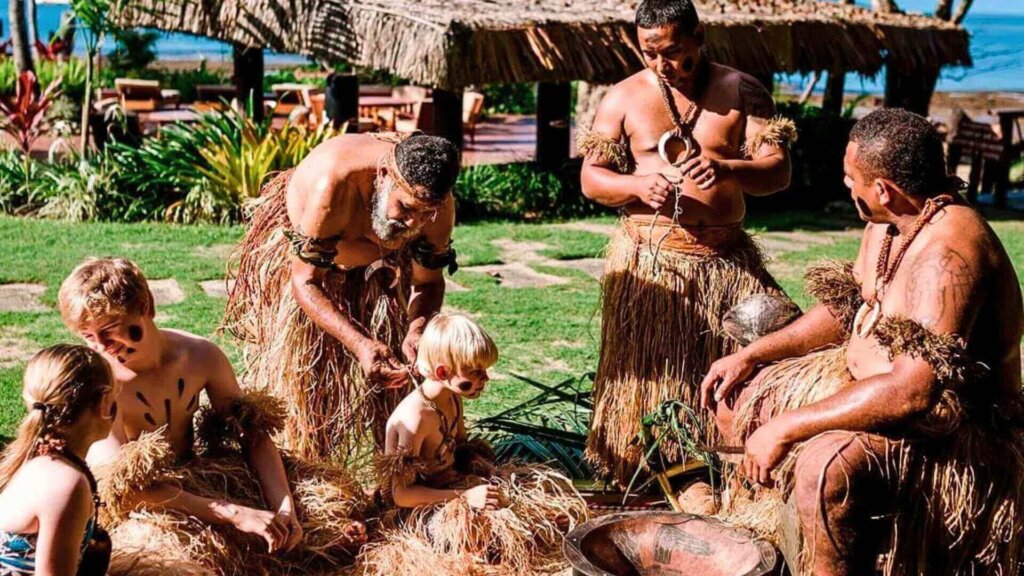Here’s a detailed breakdown of Fiji’s cultural values – the traditions, beliefs, and social practices that define Fijian life:
Cultural Values of Fiji
Fijian culture is a unique fusion of Indigenous (iTaukei) traditions, Indo-Fijian heritage, and colonial-era influences, emphasizing community, respect, spirituality, and hospitality.
1. Communal Living & Kinship
- Collective identity is central: Individuals belong to a “vanua” (land/people/community unit), not just a family.
- Life is often centered around the extended family (matavuvale) and clan (mataqali).
- Decisions are made collectively, especially in villages.
Value: Community over individualism
2. Respect for Elders and Chiefs
- Age and hierarchy are deeply respected.
- Traditional chiefly systems still play a major role in Indigenous Fijian society.
- People kneel or bow in front of elders or chiefs as a sign of respect.
Value: Authority, hierarchy, and reverence for tradition
3. Kava Ceremony (Yaqona)
- A core ritual used to welcome guests, resolve disputes, or mark celebrations.
- Drinking kava (a mildly sedative root drink) is a spiritual and social act.
Value: Ritual, unity, and sacred customs
4. Hospitality (Veilomani)
- Visitors are treated as honored guests and often offered food or a place to rest.
- “Veilomani” means “loving one another”, reflecting a warm, welcoming spirit.
Value: Generosity, kindness, and inclusivity
5. Spirituality and Religion
- Fijians are deeply spiritual.
- Indigenous Fijians are predominantly Christian (mostly Methodist), while Indo-Fijians are mostly Hindu or Muslim.
- Religion shapes daily routines, values, and community events.
Value: Faith and religious devotion
6. Language and Identity
- Fijian, Fiji Hindi, and English are all spoken and respected.
- Language is a symbol of identity and pride, particularly for preserving oral history and traditions.
Value: Cultural preservation and pride in heritage
7. Music, Dance, and Storytelling (Meke)
- Meke blends dance, music, and storytelling—used to pass down legends, history, and social lessons.
- Music features drums, chants, and lali (wooden gongs).
Value: Artistic expression and oral tradition
8. Gender Roles (Evolving)
- Traditionally, roles were divided by gender: men as warriors/fishermen, women as caregivers/farmers.
- Today, there is growing support for gender equality and female leadership, especially in urban areas.
Value: Tradition with emerging progressiveness
9. Harmony and Conflict Avoidance
- Cultural emphasis on avoiding public conflict or shaming others.
- Disagreements are handled discreetly, often through community leaders or elders.
Value: Peace, dignity, and social balance
10. Traditional Dress and Ceremonies
- Traditional attire like the sulu (wrap skirt) is worn for formal and religious events.
- Ceremonial occasions—births, marriages, deaths, chiefly installations—involve specific rituals and dress codes.
Value: Symbolism, modesty, and tradition
Cultural Diversity
Fiji’s culture is multi-ethnic:
- iTaukei (Indigenous Fijians) – strong communal traditions and ancestral ties.
- Indo-Fijians – brought Hindu festivals (e.g., Diwali), vibrant cuisine, and religious practices.
- Rotumans, Chinese, Europeans, and other Pacific Islanders contribute to Fiji’s multiculturalism.


